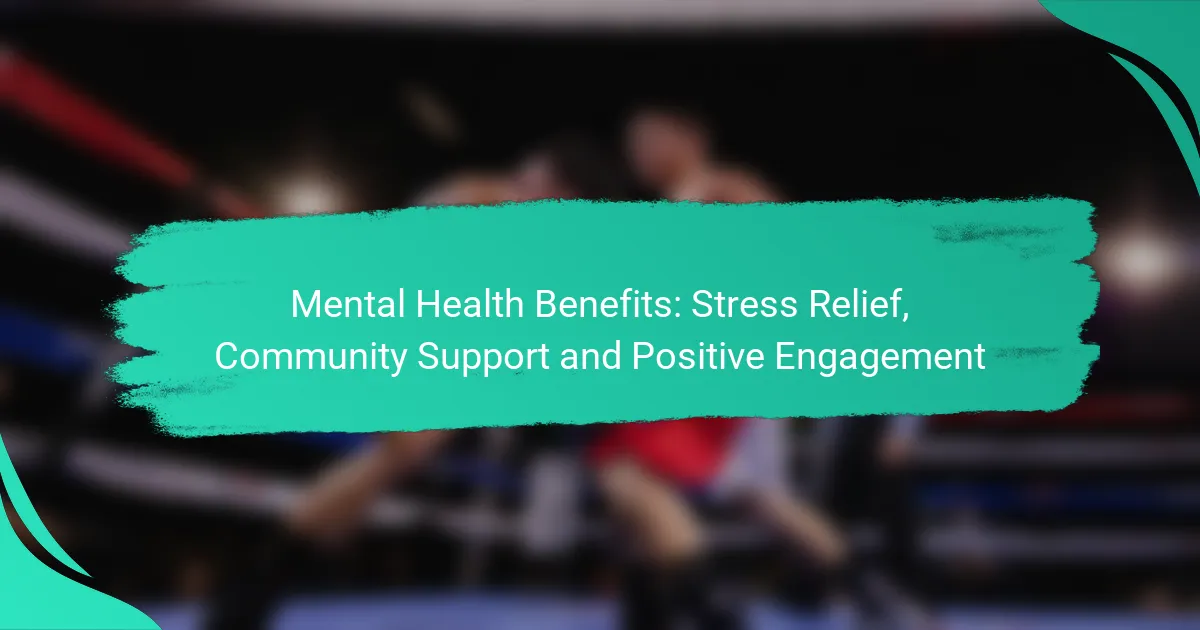Mental health benefits are profoundly influenced by effective stress relief techniques, community support, and positive engagement. By incorporating mindfulness practices and physical activity, individuals can manage stress and enhance their well-being. Additionally, fostering connections within supportive communities helps reduce isolation and promotes resilience, while engaging in positive activities encourages personal growth and creativity.
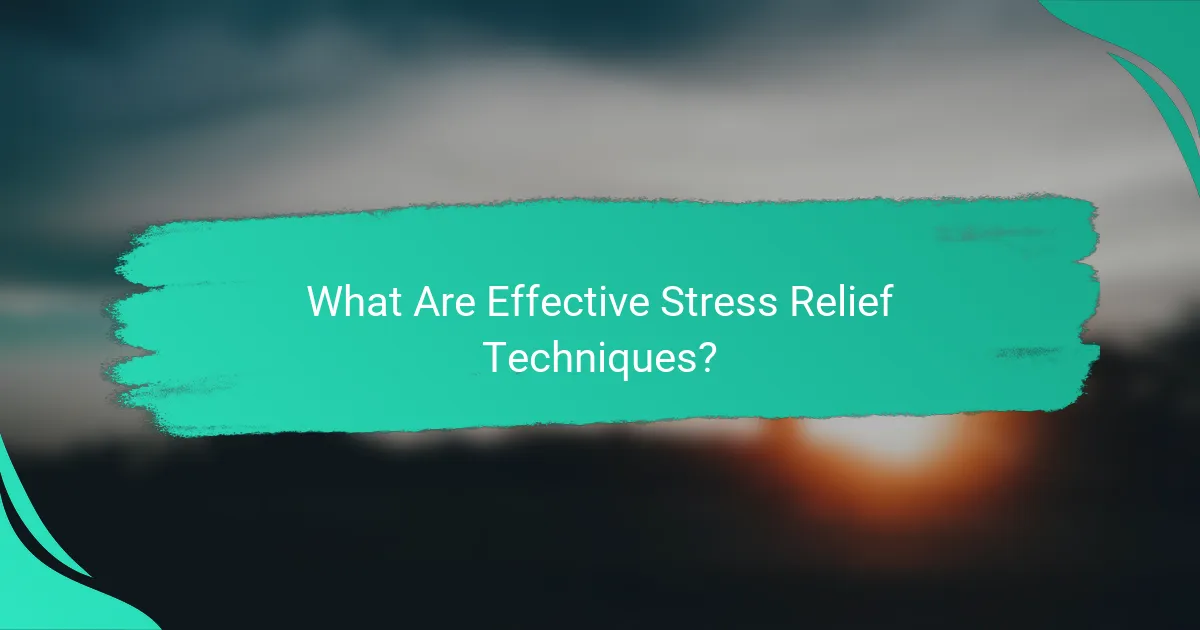
What Are Effective Stress Relief Techniques?
Effective stress relief techniques can significantly enhance mental well-being by reducing anxiety and promoting relaxation. Common methods include mindfulness practices, physical activity, and connecting with nature, each offering unique benefits for managing stress.
Mindfulness Meditation
Mindfulness meditation involves focusing on the present moment to cultivate awareness and reduce stress. Practicing this technique can be as simple as dedicating a few minutes each day to sit quietly, observe your thoughts, and breathe deeply.
To get started, find a comfortable position, close your eyes, and concentrate on your breath. When distractions arise, gently redirect your focus back to your breathing. Aim for sessions lasting 5-20 minutes, gradually increasing duration as you become more comfortable.
Physical Exercise
Engaging in physical exercise is a powerful way to relieve stress. Activities like jogging, cycling, or even brisk walking can release endorphins, which improve mood and reduce feelings of anxiety.
Try to incorporate at least 150 minutes of moderate aerobic activity into your weekly routine. This can be broken down into manageable sessions, such as 30 minutes a day, five times a week. Choose activities you enjoy to maintain motivation.
Deep Breathing Exercises
Deep breathing exercises help calm the nervous system and reduce stress levels. This technique involves taking slow, deep breaths to promote relaxation and enhance oxygen flow to the body.
To practice, inhale deeply through your nose for a count of four, hold for a count of four, and exhale slowly through your mouth for a count of six. Repeat this cycle for several minutes, focusing on the rhythm of your breath to help clear your mind.
Yoga Practices
Yoga combines physical postures, breathing techniques, and meditation to promote relaxation and reduce stress. Regular practice can enhance flexibility, strength, and mental clarity while fostering a sense of community.
Consider joining a local yoga class or following online sessions that suit your level. Aim for at least one session per week, gradually increasing frequency as you become more comfortable with the poses and techniques.
Nature Walks
Nature walks provide a serene environment that can significantly alleviate stress. Spending time outdoors exposes you to fresh air and natural scenery, which can enhance mood and promote relaxation.
Try to take a walk in a local park or nature reserve for at least 30 minutes a few times a week. Pay attention to the sights and sounds around you, allowing yourself to disconnect from daily stressors and reconnect with nature.
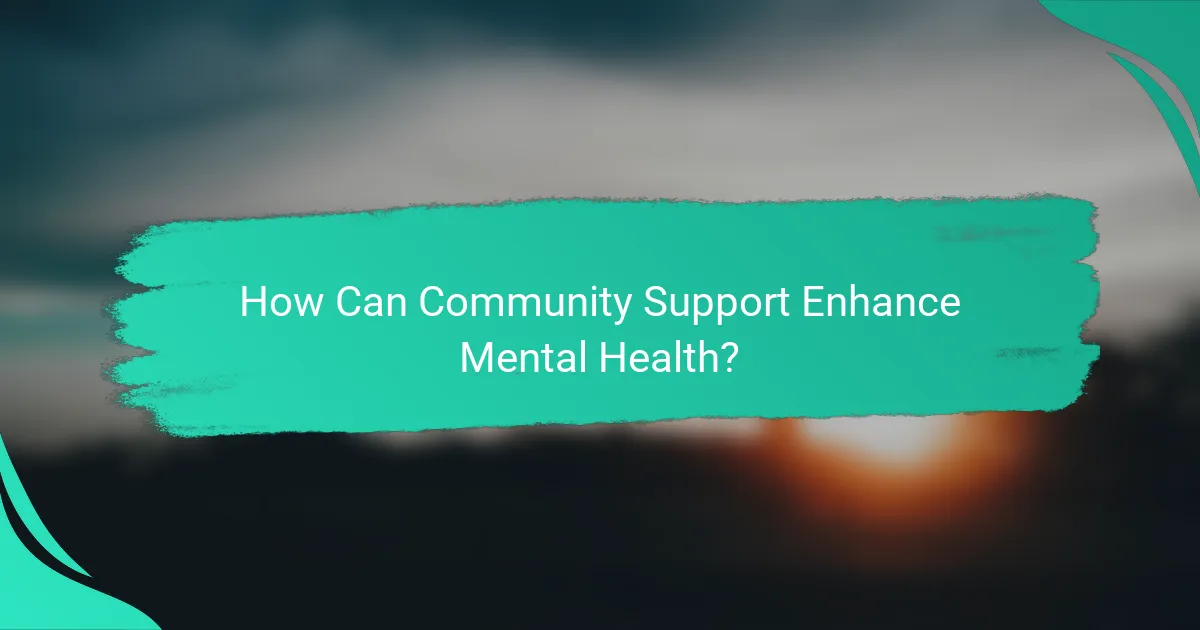
How Can Community Support Enhance Mental Health?
Community support can significantly enhance mental health by providing individuals with a sense of belonging, shared experiences, and emotional resources. Engaging with others in supportive environments fosters resilience and reduces feelings of isolation, which are crucial for maintaining mental well-being.
Support Groups
Support groups bring together individuals facing similar challenges, such as anxiety, depression, or addiction. These gatherings offer a safe space for sharing experiences and coping strategies, often led by a facilitator or peer. Participants can benefit from hearing others’ stories, which can provide new perspectives and reduce feelings of loneliness.
When considering joining a support group, look for ones that meet regularly and are facilitated by trained professionals or experienced peers. Many groups are available in-person or online, making them accessible regardless of location.
Online Forums
Online forums provide a platform for individuals to discuss mental health topics anonymously and at their convenience. These communities can be particularly beneficial for those who may feel uncomfortable seeking help in person. Participants can ask questions, share resources, and offer support to one another.
When engaging in online forums, ensure the platform is moderated to maintain a safe and respectful environment. Popular forums often have specific guidelines to help users navigate discussions and protect their privacy.
Local Community Centers
Local community centers often host mental health programs, workshops, and events aimed at promoting well-being. These centers can serve as hubs for social interaction, providing opportunities to connect with others in the community. Activities may include art therapy, yoga classes, or educational seminars on mental health topics.
Check with your local community center for available resources and programs. Many centers offer services at low or no cost, making them an accessible option for individuals seeking support.
Peer Counseling
Peer counseling involves trained individuals who share similar experiences providing support to others. This approach can be particularly effective as it fosters empathy and understanding, creating a comfortable environment for individuals to express their feelings. Peer counselors can offer guidance, share coping strategies, and help clients navigate mental health challenges.
When seeking peer counseling, look for programs that are certified or affiliated with recognized mental health organizations. This ensures that the support provided is grounded in best practices and ethical standards.
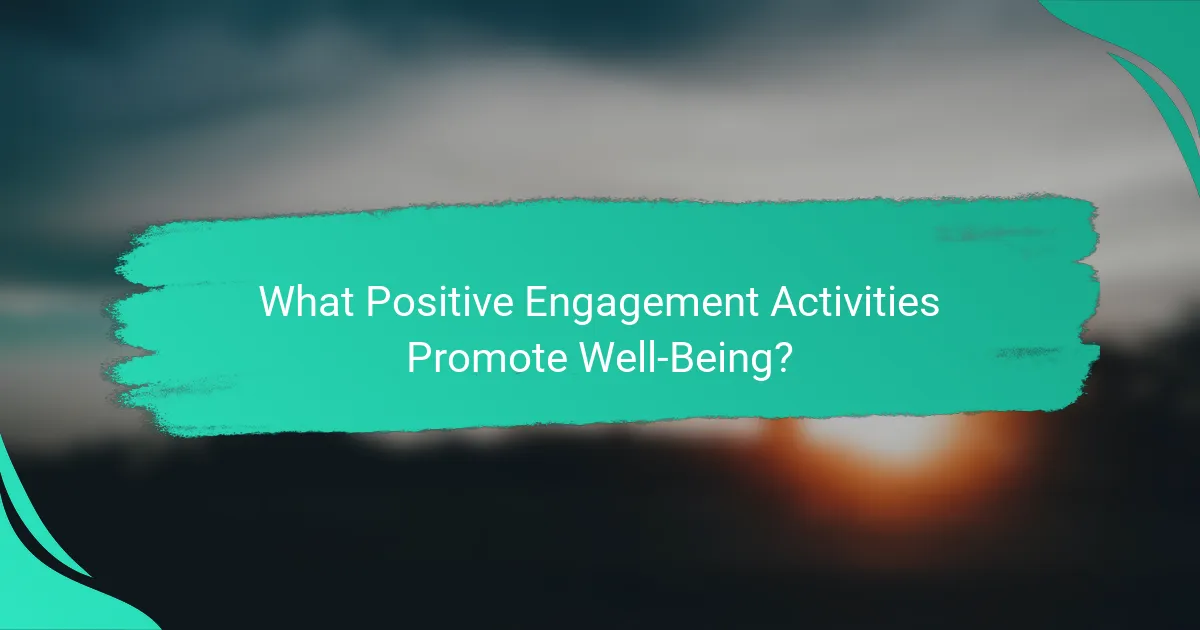
What Positive Engagement Activities Promote Well-Being?
Positive engagement activities enhance well-being by fostering connections, reducing stress, and encouraging personal growth. These activities create opportunities for individuals to interact with others, express creativity, and participate in meaningful experiences.
Volunteering Opportunities
Volunteering offers a chance to contribute to the community while enhancing personal fulfillment. Engaging in service projects can range from helping at local shelters to participating in environmental clean-ups. These activities not only provide support to those in need but also build a sense of belonging and purpose.
Consider dedicating a few hours each month to a cause you care about. Look for local organizations that align with your interests, and be mindful of the time commitment required. Many organizations appreciate even small contributions, making it easier to get involved.
Creative Workshops
Creative workshops provide a platform for self-expression and skill development, which can significantly boost mental health. Activities such as painting, pottery, or writing can help individuals channel their emotions and reduce stress. These workshops often foster a supportive environment where participants can share their work and receive constructive feedback.
Look for workshops in your area that cater to different skill levels. Many community centers and art studios offer classes at various price points, making it accessible for everyone. Joining a workshop can also lead to new friendships and a sense of community.
Group Sports
Participating in group sports is an excellent way to combine physical activity with social interaction. Team sports like soccer, basketball, or volleyball not only improve fitness but also enhance teamwork and communication skills. Engaging in regular physical activity can significantly reduce stress and improve overall mood.
Consider joining a local sports league or community team that matches your skill level. Many cities offer recreational leagues that welcome players of all abilities. Regular practice and games can help create lasting friendships and a sense of camaraderie.
Social Clubs
Social clubs provide a structured way to meet new people and engage in shared interests. Whether it’s a book club, hiking group, or cooking class, these clubs facilitate regular interaction and foster a sense of belonging. Being part of a social group can combat feelings of loneliness and enhance emotional well-being.
Research local clubs that align with your hobbies or interests. Many clubs are free or have minimal membership fees, making them accessible. Attend a few meetings to see if the group is a good fit, and don’t hesitate to try different clubs until you find one that resonates with you.
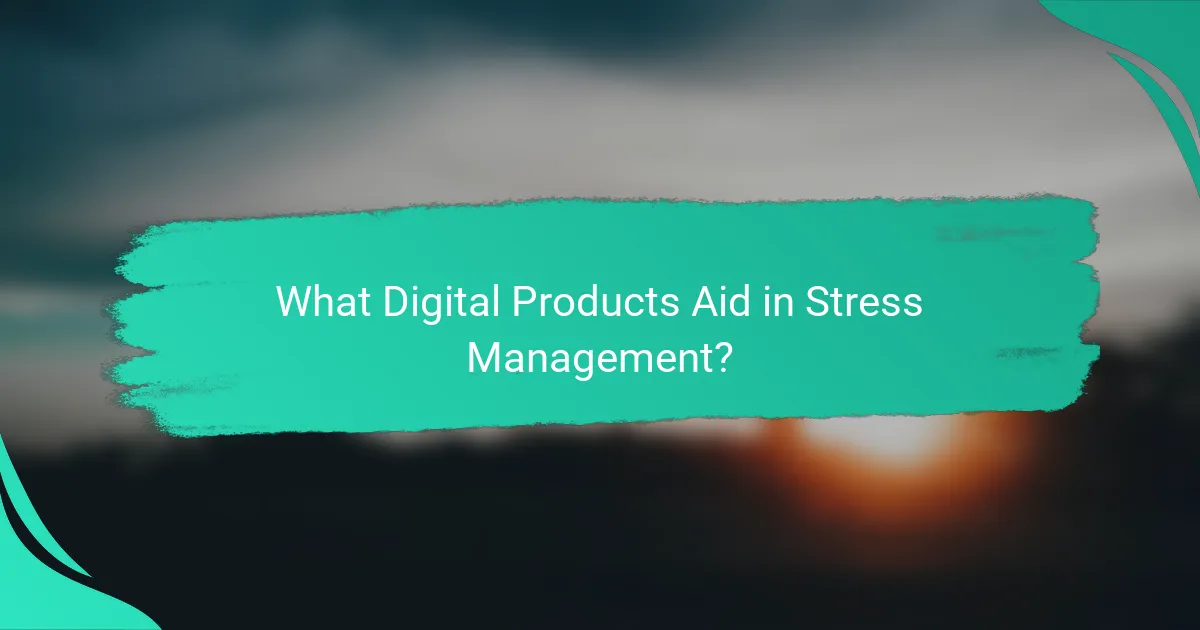
What Digital Products Aid in Stress Management?
Digital products such as apps, online therapy platforms, meditation services, and podcasts can significantly aid in stress management by providing accessible tools and resources. These platforms offer various methods for individuals to engage with mental health support and stress relief techniques at their convenience.
Mental Health Apps
Mental health apps are designed to help users track their moods, practice mindfulness, and access coping strategies. Popular examples include Headspace and Calm, which offer guided exercises and resources tailored to individual needs. When choosing an app, consider features like user reviews, ease of use, and whether it provides personalized content.
Many mental health apps are free or have low-cost subscriptions, making them accessible to a wide audience. However, be cautious of apps that claim to replace professional therapy; they should be used as complementary tools rather than substitutes.
Online Therapy Platforms
Online therapy platforms connect users with licensed therapists through video, chat, or phone sessions. Services like BetterHelp and Talkspace allow for flexible scheduling and often provide a range of pricing options, typically between $40 to $100 per week. This flexibility can make therapy more accessible for those with busy schedules or financial constraints.
When selecting an online therapy service, check for therapist credentials and user reviews. Ensure the platform complies with local regulations regarding mental health services to guarantee a safe and effective experience.
Guided Meditation Services
Guided meditation services offer structured sessions that help users practice mindfulness and relaxation techniques. Platforms like Insight Timer and Simple Habit provide a variety of meditation styles, from short sessions for beginners to longer practices for experienced users. These services often include features such as progress tracking and community support.
Consider your personal preferences when choosing a guided meditation service, such as the length of sessions and the type of guidance provided. Many services offer free trials, allowing you to explore different options before committing.
Stress Relief Podcasts
Stress relief podcasts provide listeners with insights, strategies, and expert interviews focused on managing stress and improving mental well-being. Popular podcasts like “The Happiness Lab” and “Therapy Chat” cover a range of topics, from practical tips to deeper discussions on mental health. These can be a convenient way to learn while commuting or during downtime.
When selecting a podcast, look for episodes that resonate with your specific stressors or interests. Subscribing to a few different podcasts can help you find the right mix of content that keeps you engaged and informed.
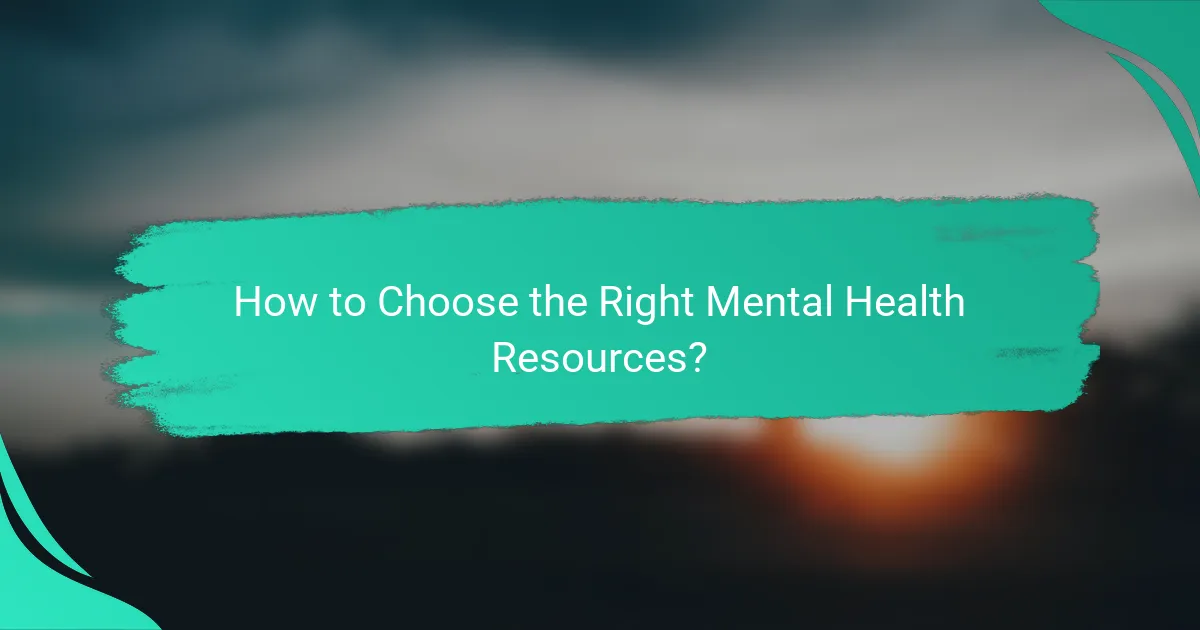
How to Choose the Right Mental Health Resources?
Choosing the right mental health resources involves understanding your specific needs and evaluating the credibility of the sources available. This ensures that you receive effective support tailored to your situation.
Assessing Personal Needs
Begin by identifying your mental health challenges, whether they involve stress, anxiety, or depression. Consider what type of support you prefer, such as therapy, support groups, or self-help materials. Reflect on your comfort level with different approaches, as this can guide your selection.
It may be helpful to create a list of your priorities, such as accessibility, affordability, or specific therapeutic techniques. For instance, if you prefer face-to-face interaction, look for local therapists or community support groups. If cost is a concern, explore options that offer sliding scale fees or free resources.
Evaluating Credibility of Sources
When assessing mental health resources, prioritize those that are backed by qualified professionals or reputable organizations. Look for credentials such as licenses, certifications, or affiliations with recognized institutions. Websites ending in .gov or .edu often provide reliable information.
Check for reviews or testimonials from others who have used the resources. This can provide insight into the effectiveness and reliability of the services offered. Additionally, consider whether the resource aligns with established mental health guidelines, such as those from the American Psychological Association or similar bodies in your country.
